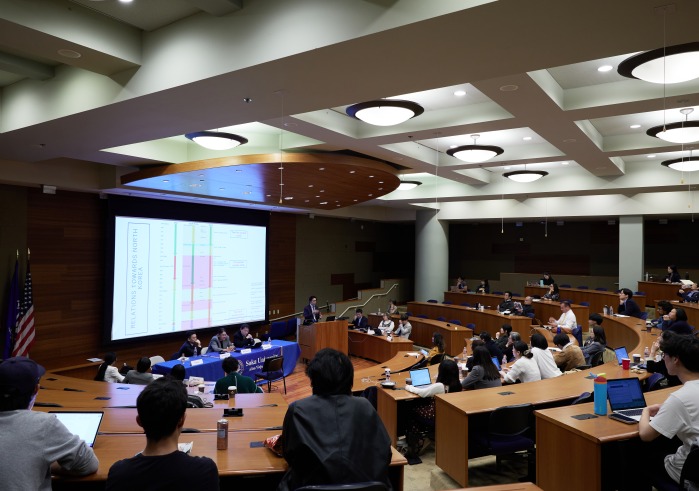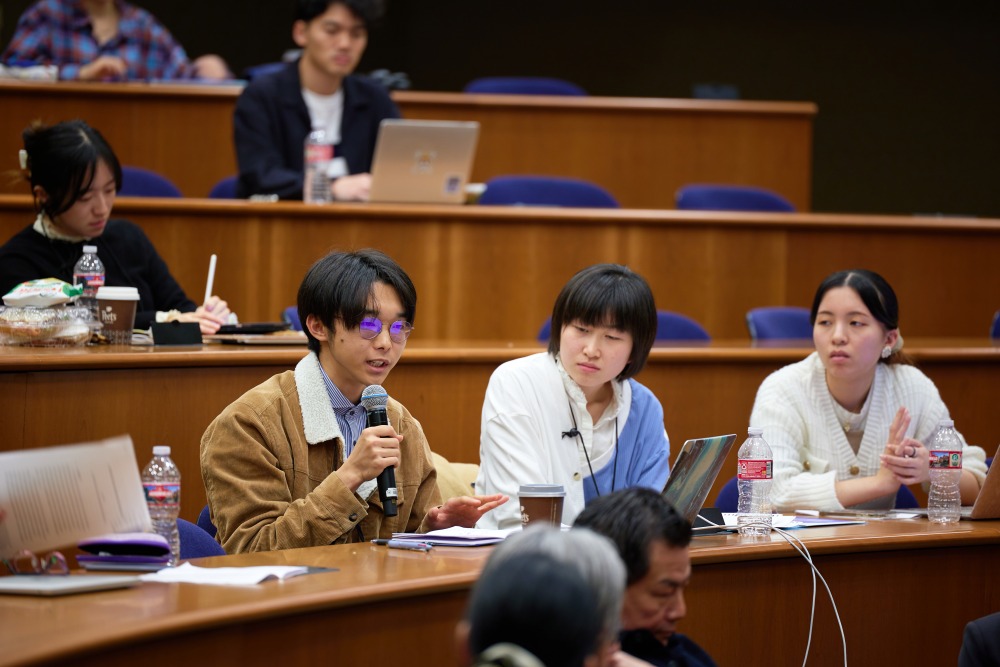Exploring Peace and Reconciliation: Soka Institute for Global Solutions Hosts Inaugural East Asia Symposium

The Soka Institute for Global Solutions (SIGS) serves as an anchor for global citizens to expand their collaborative, purposeful, and sustaining networks of global cooperation. Such cooperation was on full display at the inaugural 2024 Peace and Reconciliation in East Asia Symposium on April 19 and 20 at SUA.
“It is rare to find a three-year commitment to organizing symposia on a difficult topic like peace and reconciliation in East Asia, and it is even rarer to see that students are playing an integral role in the symposia,” said SUA Professor Tetsushi Ogata, who serves as managing director of the institute. “But SIGS symposia on Peace and Reconciliation in East Asia shows our commitment to addressing the real issues on the ground and fostering the next generation of young people to take part in this undertaking, including selecting 12 Soka students as SIGS Research Fellows for this year’s symposium.”
The Soka Institute for Global Solutions was established with two major projects, Nuclear Abolition and PreK-12 Global Citizenship Education, with each project holding significant events on campus in 2023. This year, an additional project was added: Peace and Reconciliation in East Asia.
A pre-symposium event was held on April 17 featuring a talk by Professor Roxann Prazniak, “Hung Liu (1948-2021), Artist as Radical Historian.” More pre-symposium events took place in the morning on April 19 with musical performances by SUA’s Vita Leonis Philharmonic Orchestra and Koto Club, followed by a student-led presentation, “Abandoned People,” by Kaori Nemoto ’25, Chaerin Her ’24, Sakura Kato ’26, and Taka Matsumoto ’25.
The symposium opened with words by SUA President Edward Feasel, followed by a screening of the award-winning film Untold (A War of Memories) by writer/director Bora Lee-Kil, who then gave a talk, “Untold, the Story of the Day We Don’t Remember.” After a brief recess, participants returned for a screening of In-Mates, a documentary on the 1923 massacre of Korean people during the Great Kanto Earthquake by writer/director Yuki Iiyama. The screening was followed by Iiyama’s talk, “Cultural Genocide and Narratives.”
Both films and the directors’ talks focused on war victims and their experiences, aligning with the Peace and Reconciliation in East Asia project’s goal of fostering dialogue and trust after trauma from colonialism and political injustice. The day’s talks concluded with a panel of 12 student research fellows each presenting findings from their research projects. The quality, coherence, and completeness of the Soka research fellows’ presentations earned rave reviews from symposium participants, and the institute plans to make this student-led panel a tradition that continues at next year’s symposium.
Day two began with “History, Memory, Pan-Asian/Anti-Japan Sentiments,” a session moderated by SUA Professor Emerita Xiaoxing Liu. Following lunch, SUA Professor Danielle Denardo moderated “Grassroots and Transnational Practices for Reconciliation.” The final session, “Diplomacy, Apology/Forgiveness, and Politics of Memory,” was moderated by SUA Professor Esther Chang. The day concluded with an interactive discussion moderated by Roxann Prazniak of the University of Oregon.
“All the participants expressed their appreciation for the tremendous efforts made by the organizing committee of the symposia, led by Prof. Dongyoun Hwang (chair), along with Profs. Roxann Prazniak, Seiji Takaku, and Xiaoxing Liu,” Ogata said. “We just cannot thank them enough.”
Looking Ahead to 2026 and Beyond
This symposium was the first of three on Peace and Reconciliation in East Asia that are scheduled from 2024 to 2026 and will be hosted by the institute at SUA and sponsored by the Office of the President. Each symposium will offer different focal points on events in East Asia, beginning with Japan this year, South Korea in 2025, and the People’s Republic of China in 2026. The goal of the project is to create a forum for the interdisciplinary discussion of peace and reconciliation in East Asia with honest and direct conversation about conflicts over contested histories in which both individuals and communities suffered horrific acts of violence.
The symposia embody SUA founder Daisaku Ikeda’s vision of uniting scholars, global institutions, and grassroots communities to find solutions to war, conflict, and humanity’s complex challenges.
The institute was launched based on the vision Ikeda laid out in his 1987 peace proposal, “Spreading the Brilliance of Peace toward the Century of the People,” in which he envisions a world with humanity-centered sovereignty and focuses on “world citizen education.” Ikeda also outlined concrete steps toward that end in the proposal, including the establishment of a research institute at Soka University of Los Angeles (SULA), SUA’s predecessor in Calabasas.
In his 40th and final U.N. Peace Proposal in 2022, Ikeda stressed the importance of education for world citizenship and the urgency of nuclear abolition against the backdrop of today’s increasingly precarious global situation, stating, “I am confident that learning for global citizenship will serve as a shared basis for tackling the common crises facing humankind.” He stressed the importance of “reweaving the social fabric” to confront head-on the challenges highlighted by the COVID-19 pandemic based on global solidarity.
To learn more about SIGS, visit its webpage: www.soka.edu/sigs

